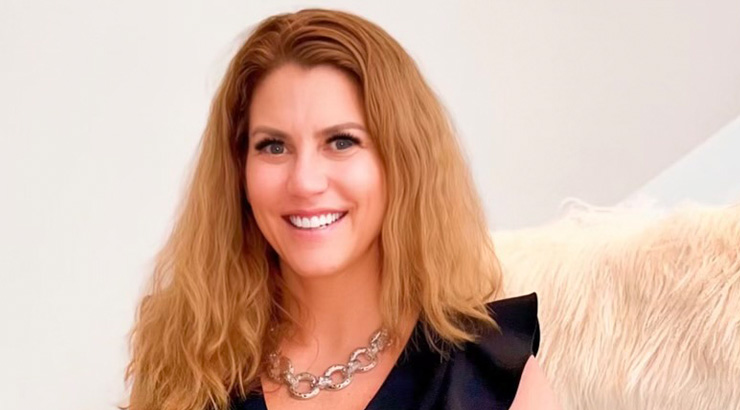
Alumni on the Move: Amanda Simmons The ABA, Lifelong Advocacy, and Lawyering with Love
November 20, 2023
What draws one to work as a lawyer and an advocate in the difficult area of child abuse, sexual abuse, and their legislation? Amanda Simmons’ (JD ’21) answer is direct and about as unequivocal as it gets: “If not me, then who?” She offers, “I waited twenty-five years for someone else to clean up this mess. No one else did. So, here I am—I’m just not going to live in a world where children are mistreated like this.”
The “mess” Simmons is referring to is neatly encapsulated in ABA Resolution 605. It prescribes ABA support for the Stop Institutional Violence Act while recognizing the need for a coordinated local, state, and federal legislative effort to regulate what has come to be known as “The Troubled Teen Industry,” with the aim of protecting vulnerable children from abuse and neglect within institutional settings.
Anything but “typical” is a fair assessment of Amanda Simmons’ career trajectory after graduating from Chapman University’s Fowler School of Law. Simmons, a survivor of sexual assault in a residential treatment center as a teenager, is one of the few lived experience attorneys who has publicly identified with this topic. A burgeoning list of accomplishments since graduation speaks for itself:
- Drafting and advocating to the American Bar Association’s (ABA) House of Delegates on Resolution 605, which endorses the Stop Institutional Child Abuse Act and aims to prevent child abuse in youth residential programs,
- Leading a panel discussion at the Coalition for Juvenile Justice,
- Speaking at the National Association of Counsel for Children,
- Being published by the American Bar Association’s Children’s Rights Committee,
- She has two articles pending for the California Women Lawyers Association and the Loyola University School of Law’s Children’s Legal Rights Journal.
- Simmons contributed opening remarks at the National Association of Women Judges (NAWJ) annual conference–receiving a standing ovation for her efforts,
- Her speaking schedule is booked up through 2024 with notable forthcoming appearances at the ABA’s Judicial Division and the National Conference of Juvenile and Family Court Judges,
- Simmons works closely with Paris Hilton’s 11:11 Media Impact and regularly presents with two of 11:11’s fiercest advocates, Caroline Cole and Chelsea Maldonado–both of whom co-presented with Simmons at the ABA when ABA Resolution 605 passed unanimously to the sound of yet another standing ovation.
It is worth mentioning that all of this has been accomplished in the two short years since graduating from law school.
However, Simmons’ difficult start to what is shaping up to be a luminous career trajectory is not as clear-cut as its present outcome. She jokes about the lack of concern she felt in meetings with Assistant Career Services Dean Susie Park, who wisely and repeatedly suggested that she would need to choose an area of law to specialize and practice in, especially if she wanted to start her own firm.
Early attempts to find a good fit with any area of the law were frustrating as Simmons disliked almost every point of focus that she tried. Ultimately, she shrugged it off, “I’ll know it when I see it,” she told herself.
After an investigative journalism article exposed the institutional abuse at the school Simmons had attended, she made the decision to speak publicly about her personal experiences there. By her 3L year, Simmons was working with experienced attorneys on institutional child abuse cases, learning the ropes of a niched and often poorly understood area of law that resonated with her on a deeply personal level.
“Once that article came out, my path became pretty clear,” she says, “and I did know it when I saw it. I remember talking to Assistant Dean Park in early 2021, and I told her I was going to do it–I was going to figure out a way to make a difference in this space.”
Simmons describes the impact of her work as both groundbreaking and, at times, overwhelming, “a lot of amazing things have happened really quickly, but it can be very painful, and tiring, to relive my past publicly. I’m not sure I was prepared for that.”
Working in the challenging space of trauma, sexual assault, and the abuse of minors is fraught with vicarious trauma. Still, Simmons seems to have found her feet, and her voice, in the attempt to answer a tough question about establishing a fledgling legal practice: How do I lawyer in a way that feels safe, and nurturing for me?
“This stuff can be tough on families,” Simmons adds, acknowledging the sacrifices and challenges her family has faced alongside her as her advocacy and determined stance on these issues has evolved. “Any time I feel burned out, I know I’m not prioritizing my need for rest, my yoga practice, my wellness,” she says, “when these things are at the top of the list, there is always more energy for other things. I’m much more effective when I prioritize my own health and wellness.”
At a time when the legal profession is starting to discuss ideas like well-being, self-care and resilience openly, it is hard to find a clearer voice on the subject of lawyering with self-care and compassion than Simmons, “If you take care of yourself, and seek support from others, you can really overcome just about anything. There are a million ways to lawyer in the world; it is important to find one that is authentic, that nurtures you, and keeps you safe and healthy.”
Simmons’ need to prioritize self-care is something that often requires her to relinquish her role as an outspoken advocate. She confesses that she sometimes considers leaving lived experience advocacy, despite the gratitude she feels as the writing, speaking, and other advocacy opportunities keep presenting themselves. “I only accept projects that are guided by lawyers who are wiser and more experienced than me. It helps to ensure my own judgment stays sharp if I have someone with good judgment and objectivity to share ideas and strategies.”
For all the accomplishments, ovations and fierce advocacy, the central question that seems to drive Amanda Simmons’ approach to the law is whether there is a space for genuine compassion and love within the legal system. “Lived experience advocacy can be emotionally perilous,” she advises cautiously, “I’m proud to have integrated personal experiences that could have destroyed me into my work in a way that brings healing to me and many others… The point of my story is that no matter what happens, you can figure out a way to live a meaningful life. There are always ways to make sense of it.”
Is there truly a way to lawyer meaningfully with compassion and self-care? There may be an answer to this question in the example of this singular Chapman Law alumna, who called her practice Ambika Law, from the Sanskrit word to mother and protect, with compassion.

